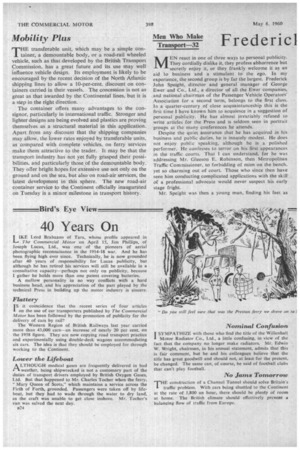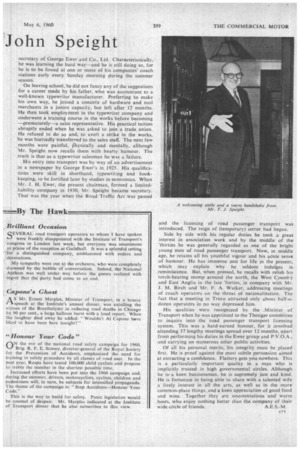40 Years On
Page 66

Page 67

If you've noticed an error in this article please click here to report it so we can fix it.
----By The Hawk
I IKE Lord Brabazon of Tara, whose profile appeared in .1—A The Commercial Motor on April 15, Jim Phillips, of Joseph Lucas, Ltd., was one of the pioneers of aerial photographic reconnaisance in the 1914-18 war. And he has been flying high ever since. Technically, he is now grounded after 40 years of responsibility for Lucas publicity, but although he has retired his services will still be available in a consultative capacity—perhaps not only on publicity, because I gather he holds more than one patent covering batteries.
A mellow personality in no way conflicts with a hard business head, and his appreciation of the part played by the technical Press in building up the motor industry is sincere.
Flattery
iS it coincidence that the recent series of four articles I on the use of car transporters published by The Commercial Motor has been followed by the promotion of publicity for the delivery of cars by rail?
The Western Region of British Railways last year carried more than 43,000 cars—an increase of nearly 20 per cent, on the 1958 figure. They are now copying road transport practice and experimentally using double-deck wagons accommodating six cars. The idea is that they should be employed for through working to the Continent.
Lower the Lifeboat
ALTHOUGH medical gases are frequently delivered in bad weather, being shipwrecked is not a customary part of the duties of transport drivers employed by British Oxygen Gases, Ltd. But that happened to Mr. Charles Tocher when the ferry, " Mary Queen of Scots," which maintains a service across the Firth of Forth, grounded. Passengers were taken off by lifeboat, but they had to wade through the water to dry land, as the craft was unable to get close inshore. Mr. Tocher's van was salved the next day.
n24
Nominal Confusion
T SYMPATHIZE with those who find the title of the Willenhall Motor Radiator Co., Ltd., a little confusing, in view of the fact that the company no longer make radiators. Mr. Edwin W. Wright, chairman, in his annual statement, admits that this is fair comment, but he and his colleagues believe that the title has great goodwill and should not, at least for the present, be changed. The same can, of course, be said of football clubs that can't play football.
No Jams Tomorrow
THE construction of a Channel Tunnel should solve Britain's traffic problem. With cars being shuttled to the Continent at the rate of 1,800 an hour, there should be plenty of room at home. The British climate should effectively prevent a balancing flow of traffic from Europe.
Brilliant Occasion
SEVERAL road transport operators to whom I have spoken were frankly disappointed with the Institute of Transport's congress in London last week, but everyone was unanimous in praise of the reception at Guildhall. It was a splendid setting for a distinguished company, emblazoned with orders and decorations.
My sympathy went out to the orchestra, who were completely drowned by the babble of conversation. Indeed, the National Anthem was well under way before the guests realized with regret that the party had come to an end.
Capone's Ghost
A S Mr. Ernest Marples, Minister of Transport, in a breezy speech at the Institute's annual dinner, was extolling the virtues of the Breathalyzer in reducing road deaths in Chicago by 90 per cent., a large balloon burst with a loud report. When the laughter died away he added: "Wouldn't Al Capone have liked to have been here tonight?"
"Honour Your Code"
ON the eve of the national road safety campaign for 1960, Brig. R. F. E. Stoney, director-general of the Royal Society for the Prevention of Accidents, emphasized the need for training in safety procedure by all classes of road user. In the past year, Rospa have tested 100,000 child cyclists and propose to treble the number in the shortest possible time.
Increased efforts have been put into the 1960 campaign and, during the summer, drivers, motorcyclists, cyclists, children and pedestrians will, in turn, be subjects for intensified propaganda. The theme of the campaign is: "Stop Accidents—Honour Your Code."
This is the way to build for safety. Panic legislation would be counsel of despair. Mr. Marples indicated at the Institute of Transport dinner that he also subscribes to this view.




































































































































































































































































